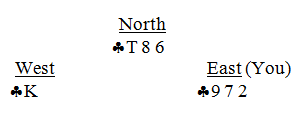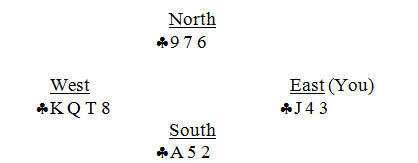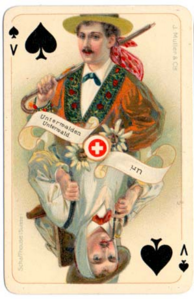Source: http://wimpy.biz/kibitzer/
Most (good) players know I play upside down count and attitude signals (UDCA). I endorse them so strongly; I began teaching newer players to use them in my classes. It’s the first change that I insist upon when I take on a new student. I truly don’t understand why new programs for beginners haven’t begun using them as the standard defensive carding signal. After convincing scores of players to switch, (many who’d used standard signals for decades), I’ve yet to find a single one who decided to switch back. If you haven’t switched over, what are you waiting for? The most common excuse I hear is that “my partner won’t do it.” Why not check again? Maybe your partner is using the same excuse.
It’s not an illusion. UDCA is not a party trick or a gimmick. It’s a superior (i.e. more effective) method of defending accurately. I won’t deny that it will take a little bit of time to adjust. After all, most of us had been doing things the opposite way for a very long time. You will see the benefits quickly however. Here are just a few reasons to make the effort:
With UDCA there is less ambiguity when you want to encourage a continuation
Suppose partner leads the King of Clubs in these situations:

You would like partner to continue Clubs. You want to signal encouragement to continue. In (A), would you rather play the three or the nine? Which card can you afford? Depending on partner’s length in clubs, signaling with the nine might eventually cost a trick. The biggest drawback to standard attitude signaling is that you are forced to determine which is the highest card you can afford that partner will recognize as high. In (B), you want to tell partner to continue clubs if he regains the lead. What card can you afford if you are playing standard signals? The Jack? Are you going to risk that partner will know that the Four is a come-on signal? Playing UDCA, the Deuce sends the message you want.
If you want to discourage a continuation, you can usually afford to pitch your highest card.
Suppose partner leads the King of Clubs in this situation:
Do you think that the Nine of Clubs is a card that you can’t afford to waste? Do you think that any club of yours is going to matter to the defense in any way? While it’s true that playing standard signals that you can play the Deuce of Clubs to discourage that suit, what have you gained? You’ve managed to keep a truly irrelevant card in a suit that you could care less about. These examples lead us to two noteworthy observances of the advantages to UDCA vs. Standard carding:
- UDCA allows you to keep high spot cards in suits you want to develop
- Using UDCA, you will frequently burn irrelevant high spot cards in hopeless suits.
With UDCA it is more difficult for declarer to falsecard to attempt to disguise his holding.
Suppose partner leads the King of Clubs in this situation:

Playing Standard signals, declarer can comfortably play the ![]() 2 under the
2 under the ![]() 4, hoping to persuade West that you have played the most discouraging card you could, (possibly from
4, hoping to persuade West that you have played the most discouraging card you could, (possibly from ![]() 5 4) and induce West to shift, fearing that South may have
5 4) and induce West to shift, fearing that South may have ![]() A J 3 2. Playing UDCA, you play the
A J 3 2. Playing UDCA, you play the ![]() 3 on the first trick and South will falsecard with the
3 on the first trick and South will falsecard with the ![]() 5. West will wonder who holds the Deuce, noting that if you held it, you must hold exactly
5. West will wonder who holds the Deuce, noting that if you held it, you must hold exactly ![]() 3 2 doubleton (or else you would have played a higher card). If the bidding has made it improbable that South holds 4 clubs, West may be able to work out to continue.
3 2 doubleton (or else you would have played a higher card). If the bidding has made it improbable that South holds 4 clubs, West may be able to work out to continue.
One of the main advantage of UDCA is there is no card lower than the lowest outstanding card in a suit. When you want to signal encouragement in a suit using standard methods, you will rarely play the highest outstanding card in the suit to show it. You can’t afford it. Instead you must play the highest card you think you can afford, and hope that partner will be able to read it.
When you have been lucky enough to be dealt the lowest outstanding card in a suit that you want continued, there can be no mistaking your signal. Declarer can try to falsecard with any card he likes, but the message is loud and clear. When you don’t want a suit continued, and you play what appears to be a high card, it will usually be all but impossible for declarer to play a card which may raise a doubt about the meaning of the signal. There will be too many missing lower cards for partner to be misled.
To sum up, it’s difficult to come up with a compelling argument for standard signals other than habit. Just like smoking – it’s got to go. So much for the “A” in UDCA. Next time, I’ll go over the count implications of defending “upside down”.


